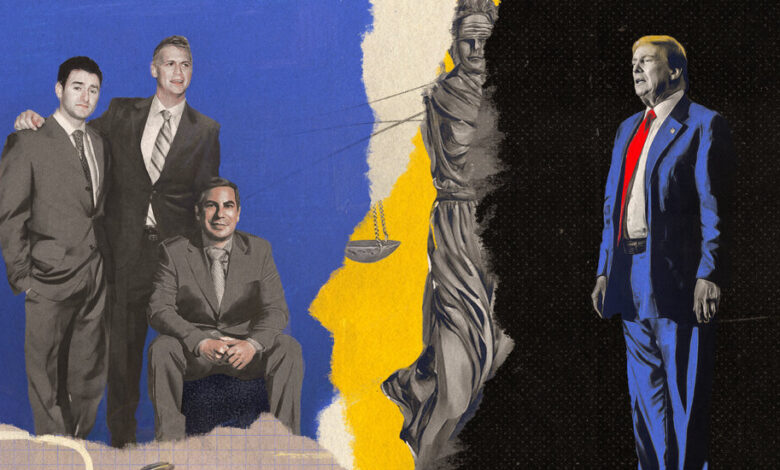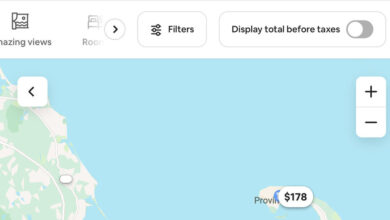Legal Fight Over Trump Media’s Ownership Adds to Its Woes

Twenty years ago, Wes Moss and Andy Litinsky met Donald J. Trump as contestants on his reality TV show, “The Apprentice” — a connection that led them to help launch the former president’s social media platform, Truth Social, with his blessing.
Now, they might as well be starring in an episode of “Family Feud.”
For weeks, Mr. Moss and Mr. Litinsky have been fighting with Trump Media & Technology Group, the parent company of Truth Social, over their roughly 8 percent stake in the company. In February, they sued the company, claiming that Trump Media — which made its trading debut last month at an $8 billion valuation — was trying to deprive them of the full value of their shares. Now they also claim the company is trying to prevent them from selling those shares.
In a separate lawsuit that followed, Trump Media claimed that Mr. Moss and Mr. Litinsky should forfeit their shares because their poor decision-making had contributed to a yearslong delay in its merger with Digital World Acquisition Corporation. Trump Media agreed to merge with Digital World, a cash-rich shell company, in 2021 as a way to go public, but the deal closed only in March.
The pair’s stake is worth more than $220 million based on the current $26 share price of Trump Media, compared with $2 billion for Mr. Trump. Overall, the stock has fallen about 62 percent from where it began trading on March 26.
The litigation provides a portrait of some of the chaos that has bedeviled Trump Media since its inception. The lawsuits are also a distraction for the fledgling company, which is struggling to show that it is a viable business rather than a money-losing entity whose value is derived solely from Mr. Trump’s presence on its flagship platform. On Tuesday, the company announced plans to launch a streaming video service to draw in more users.
Mr. Moss, now an Atlanta financial planner and radio host, and Mr. Litinsky, a conservative media personality, met Mr. Trump during the second season of “The Apprentice,” which ran for 15 episodes in 2004. Mr. Trump “fired” the two men in Weeks 11 and 12. Mr. Litinsky would later take a job as president of Mr. Trump’s television production company.
Just weeks after Mr. Trump left the White House in early 2021, Mr. Moss and Mr. Litinsky pitched him on creating a social media company. They came up with the idea after Twitter, now X, and other social media platforms barred Mr. Trump in the aftermath of the Jan. 6 riot at the U.S. Capitol.
The two men convinced him that if he started his own company, he wouldn’t have to worry about being censored and his supporters would follow him to the new platform. Mr. Trump was intrigued enough to lend his name to the effort in exchange for a majority stake in the company. He didn’t invest any of his own money.
The parties drew up an agreement that authorized United Atlantic Ventures, a company set up by Mr. Moss and Mr. Litinsky, to put the plan in motion. In return, they were promised an equity stake in Trump Media.
Mr. Moss and Mr. Litinsky, who were on Trump Media’s board, were instrumental in negotiating the October 2021 merger agreement with Digital World, a special purpose acquisition company, or SPAC, that had raised $300 million in an initial public offering. SPACs raise money in an I.P.O. in order to buy an existing company like Trump Media, allowing the operating business to go public.
In February 2022, Truth Social made its debut, quickly becoming the former president’s main online megaphone.
Things soon began to go south, not long after Mr. Trump appointed Devin Nunes, the former Republican congressman from California, as Trump Media’s chief executive. By that summer, Mr. Moss had resigned from the company’s board; Mr. Litinsky had done so earlier.
In their lawsuit, filed in Delaware Chancery Court, the two men claimed that their relationship with Trump Media had soured after Mr. Litinsky refused Mr. Trump’s request to give some shares to his wife, Melania, long before the company began to trade.
Trump Media has claimed in its lawsuit, filed in March in Florida state court, that Mr. Moss and Mr. Litinsky “failed spectacularly at every turn.” The suit blamed the men for the poor rollout of Truth Social, which was marred by technical glitches that Trump Media said had generated “hostile” press coverage. Trump Media also said some of the actions of Mr. Moss and Mr. Litinsky had contributed to an investigation by the Securities and Exchange Commission that delayed the merger.
Christopher Clark, a lawyer for United Atlantic, said Trump Media’s lawsuit against his clients was “meritless.” He said that if Trump Media had any claims against his clients, it should bring them before the Delaware court rather than in a separate lawsuit in Florida.
This month, the judge in the Delaware proceeding, Vice Chancellor Sam Glasscock III, questioned the rationale for filing a suit in Florida, saying he was “dumbfounded.”
Samuel Salario, a lawyer for Trump Media, said that the company’s “complaint speaks for itself,” and that Trump Media would prevail in court.
In their lawsuit, Mr. Moss and Mr. Litinsky claimed their right to 8 percent of Trump Media’s shares and the ability to sell them immediately. They alleged that Trump Media had unfairly barred their company, United Atlantic, from selling any shares for six months, just as the merger with Digital World was being completed. The timing of the action was punitive and “retaliatory,” Mr. Moss and Mr. Litinsky alleged.
Trump Media has argued that the lockup is consistent with how other large shareholders are being treated and that, in any event, the two men forfeited their rights to those shares. The six-month lockup imposed on United Atlantic is similar to a share-selling restriction that also applies to Mr. Trump and investors who backed Digital World before the SPAC went public in 2021.
Legal experts said it was not unusual for founders of a company that went public to become embroiled in a battle over who should get the most shares.
“It’s all about dividing the pie but not about the fate of the pie itself,” said Usha Rodrigues, a professor of corporate law at the University of Georgia School of Law. “Donald Trump is still going to be in control. It’s just about sorting out the pieces.”
Mr. Moss and Mr. Litinsky aren’t the only ones fighting in court over their equity stake.
Patrick Orlando, the former chief executive of Digital World, is also suing to get more shares of Trump Media, claiming the SPAC’s board wrongly cast him aside a year before the merger was completed.
Mr. Orlando was pushed out in the middle of the S.E.C. investigation, in which regulators said early merger negotiations between Digital World and Trump Media had violated federal securities laws. The S.E.C. did not charge him with any wrongdoing, and Digital World eventually reached an $18 million settlement with regulators.
Mr. Orlando and his lawyers did not respond to requests for comment.
In claiming that Mr. Moss and Mr. Litinsky’s actions contributed to the regulatory investigation, the Trump Media lawsuit said the two men were apprehensive of how Mr. Orlando was conducting the merger talks but continued to negotiate with him anyway.
The suit noted that after one meeting with Mr. Orlando in April 2021, Mr. Litinsky wrote in his notes: “I get scared, is he wearing a wire?”
Kitty Bennett and Susan C. Beachy contributed research.



